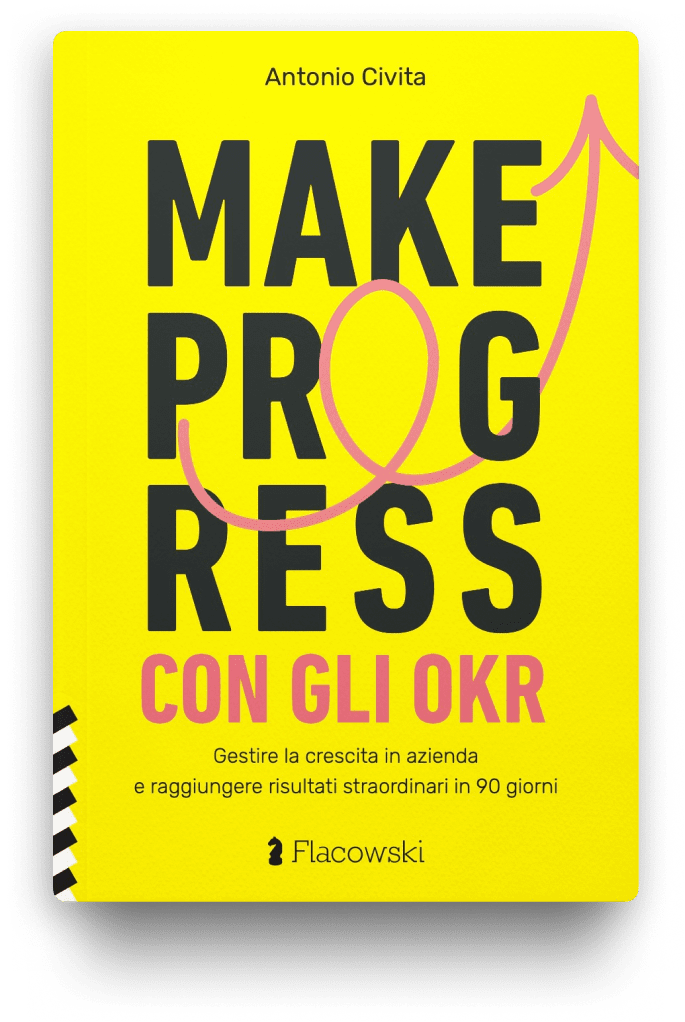| Before you start Applications are now open for the September cohort to become a MAKE PROGRESS® Qualified OKR Coach. → Register for the free webinar and collect your bonuses. |

“The key is not to prioritize what’s on your agenda, but to put your priorities on your agenda.”
— Stephen R. Covey
–
There are two types of companies.
In the first, numbers are a threat.
Every meeting is a courtroom. The financial report is projected as if it were the murder weapon and a culprit is sought.
“The report says outgoing calls dropped 15%. What happened?”
«We focused on quality leads, so the volume…»
“I don’t care about explanations. The target was 50, I see 42. Who hasn’t done their job?”
The air is getting heavy. People are becoming defensive. No one wants to understand, only to judge.
Then there is the second type of company.
The one we help build in STRTGY with MAKE PROGRESS®.
Here, OKRs are mini-research laboratories on the future of work .
Numbers are not a weapon, but the consequences of a continuous experiment.
“The data shows that calls have dropped by 15%.”
“Yes, the hypothesis was that by focusing on better leads, we would reduce volume. How’s the conversion rate?”
“It’s increased by 5%. The average order has also increased by 15%. The experiment seems to be working. Maybe we can reduce calls even further and pass this new process on to our colleagues.”
Here, the air is light. People are curious. No one wants to judge; everyone wants to learn and evolve.
Recently, talking about this very thing, a comment arrived.
A few words, sharp as a piece of glass: “This stuff is the quintessential micromanagement.”
This was written by someone who, I knew for a fact, had had a terrible experience with OKRs in the past. Her wound was real, as was her pain.
His comment was not an attack, but the lament of someone who, even faced with the promise of a laboratory, could see nothing but the ghost of the old judge.
The interesting thing is that I knew the context. I know that the leader of that team works every day to create a healthy environment. He’s not a tyrant.
But we know that once you have an idea about your industry, your category, the way of working in general, it’s really difficult to change it.
When you live in a fear-based environment, every request for transparency feels like a threat. Every number shared becomes a potential weapon pointed at you. The feeling is: “Why should I stop myself from doing my job, which I do well, to give you numbers you’ll use to judge me?”
The value of a tool depends entirely on how you use it, not simply on whether it fails.
OKRs, like KPIs or any other tool, applied without a strategy can easily become micromanagement.
But, within a well-constructed and shared strategy, they become a very powerful tool for bringing clarity and aligning people on the important things.
Asking to update a couple of KPIs is not micromanagement.
It becomes so when the context is missing.
Yes, but… «Going to ask your colleagues every Monday how many calls they made, or how many offers they sent, or how many customers they stalked is still micromanagement.»
And if the objective had been, for example, “improving the effectiveness of the sales process,” then these indicators would have made a different sense. They would have allowed us to understand whether the team’s behaviors and the quality of the processes were evolving correctly to resolve a strategic bottleneck.
An OKR should never be judged in the abstract.
An OKR is only relevant within the context of your current strategy. One cycle may help you stabilize your tactical output, while the next cycle may allow you to set more ambitious, more motivating goals.
This is why a short-term tactical OKR must always be linked to a long-term objective: only in this way can you understand whether your choices are working.
Even failing an OKR, in this sense, is as important a learning experience as achieving one.
With a good OKR architecture and an objective approach to measurement, you might have discovered that the greatest results come not from more calls and more offers, but from fewer activities and greater precision. And above all, with less of a sense of stalking for customers.
If your OKR leads you to this discovery, then you are using it well.
The best intentions are not enough without a “system”.
You can have the best intentions. You can swear to your team that the goal is to learn, not to punish. But if you don’t create an environment of absolute psychological safety, your words won’t be enough. People won’t listen to what you say. They’ll listen to what their fear whispers to them.
This is where the most important game is played. Not in defining goals, but in protecting the check-in ritual.
Check-in can’t be a courtroom. It can’t even be an exam.
It should be a sacred moment of synchronization. A moment when we look into each other’s eyes and ask ourselves:
- “Are the results we’re seeing bringing us closer to where we wanted to go?”
- “What did we learn this week?”
- “Is there a way to achieve the same result by working less? Or more intelligently?”
The last question is crucial.
A good check-in isn’t about pushing people to do more. Often, it’s about finding ways to do more. Less. To eliminate unnecessary work. To cut out what doesn’t add value.
When a team understands this, the fear of judgment disappears. Reporting is no longer an admission of guilt or a boast. It becomes a tool to simplify life, together.
That painful comment reminded me that our job isn’t to sell tools or methodologies. It’s to help leaders build safe spaces.
Spaces where the ghosts of the old courts cannot enter. Where trust is stronger than skepticism. And where a number is merely information, never a weapon.
Accept my invitation

Building these safe spaces is an art that every leader, manager, or consultant should master.
But it’s not a skill that can be improvised. It’s the expertise that distinguishes those who apply a methodology from those who lead a true cultural transformation. If you too want to stop collecting failed attempts and become the confident guide who transforms check-ins into learning workshops, consider accepting my invitation.
It’s not just about learning the theory of OKRs, but about mastering a practical method for facilitating difficult conversations, managing skepticism, and demonstrating that a new way of working is possible.
On Wednesday, September 18th at 6:00 PM, in a free webinar, I’ll show you our complete journey to becoming a Qualified OKR Coach. You will discover
- how our certified method works,
- How to Exit Survival Mode
- because filling the “Strategic Debt” is the only real priority for those tired of working 60 hours a week without seeing measurable progress.
Click here to reserve your free spot and discover the full program.

